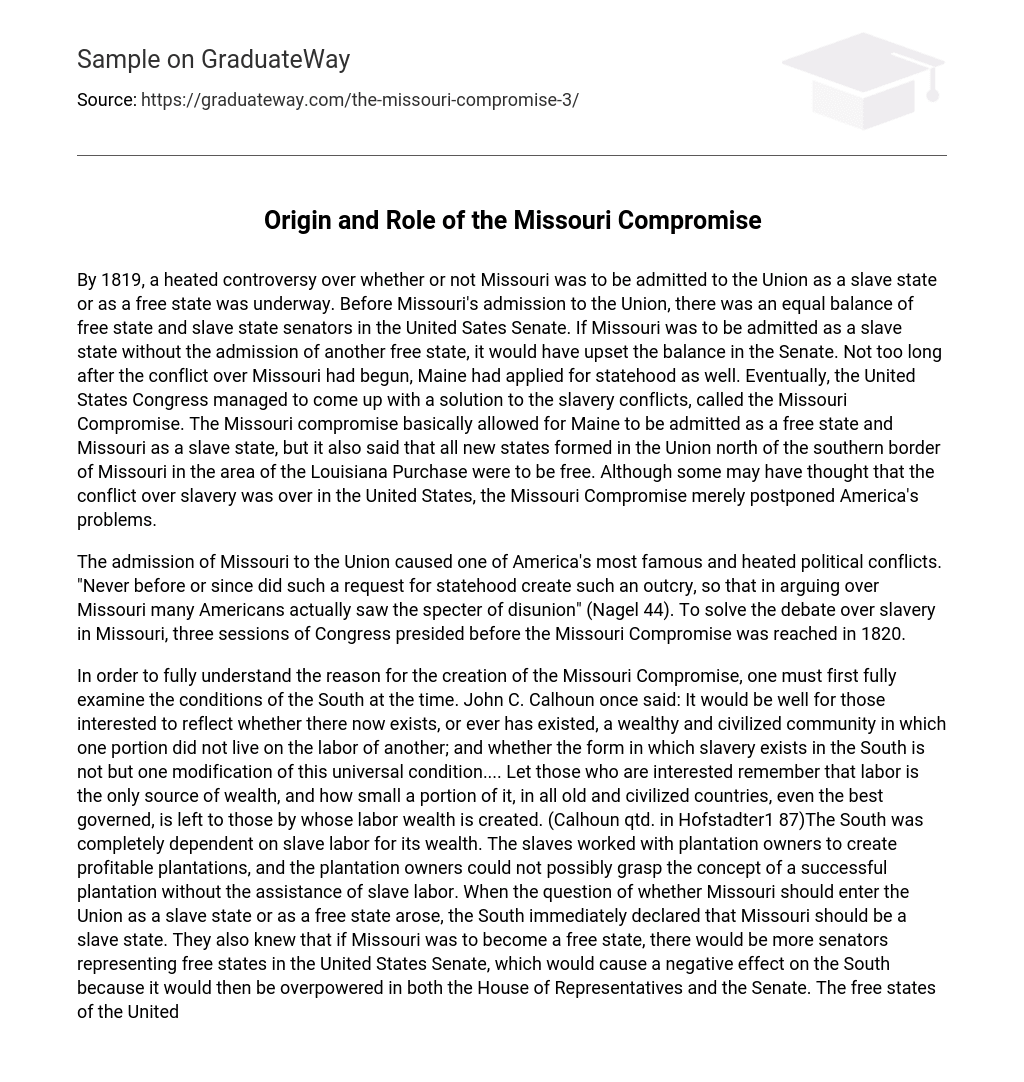By 1819, a heated controversy over whether or not Missouri was to be admitted to the Union as a slave state or as a free state was underway. Before Missouri’s admission to the Union, there was an equal balance of free state and slave state senators in the United Sates Senate. If Missouri was to be admitted as a slave state without the admission of another free state, it would have upset the balance in the Senate. Not too long after the conflict over Missouri had begun, Maine had applied for statehood as well. Eventually, the United States Congress managed to come up with a solution to the slavery conflicts, called the Missouri Compromise. The Missouri compromise basically allowed for Maine to be admitted as a free state and Missouri as a slave state, but it also said that all new states formed in the Union north of the southern border of Missouri in the area of the Louisiana Purchase were to be free. Although some may have thought that the conflict over slavery was over in the United States, the Missouri Compromise merely postponed America’s problems.
The admission of Missouri to the Union caused one of America’s most famous and heated political conflicts. “Never before or since did such a request for statehood create such an outcry, so that in arguing over Missouri many Americans actually saw the specter of disunion” (Nagel 44). To solve the debate over slavery in Missouri, three sessions of Congress presided before the Missouri Compromise was reached in 1820.
In order to fully understand the reason for the creation of the Missouri Compromise, one must first fully examine the conditions of the South at the time. John C. Calhoun once said: It would be well for those interested to reflect whether there now exists, or ever has existed, a wealthy and civilized community in which one portion did not live on the labor of another; and whether the form in which slavery exists in the South is not but one modification of this universal condition…. Let those who are interested remember that labor is the only source of wealth, and how small a portion of it, in all old and civilized countries, even the best governed, is left to those by whose labor wealth is created. (Calhoun qtd. in Hofstadter1 87)The South was completely dependent on slave labor for its wealth. The slaves worked with plantation owners to create profitable plantations, and the plantation owners could not possibly grasp the concept of a successful plantation without the assistance of slave labor. When the question of whether Missouri should enter the Union as a slave state or as a free state arose, the South immediately declared that Missouri should be a slave state. They also knew that if Missouri was to become a free state, there would be more senators representing free states in the United States Senate, which would cause a negative effect on the South because it would then be overpowered in both the House of Representatives and the Senate. The free states of the United States of America, however, felt very differently about the whole situation. They did not feel that Missouri should enter the Union as a slave state. They were very much against the use of slave labor. William Lloyd Garrison once said: Assenting to the “self-evident truth” maintained in the American Declaration of Independence, “that all men are created equal, and endowed by their creator with certain inalienable rights–among which are life, liberty, and the pursuit of happiness,” I shall strenuously contend for the immediate enfranchisement of our slave population…. On this subject, I do not wish to think, or speak, or write with moderation. No! No! Tell a man whose house is on fire to give a moderate alarm; tell him to moderately rescue his wife from the hands of the ravisher; tell the mother to gradually extricate her babe from the fire into which it has fallen;–but urge me not to use moderation in a cause like the present. (Garrison qtd. in Hofstadter2 321-322) Although Garrison had written those words in 1831, the people of the North had always shared the same opinion. That opinion was one that was the exact opposite of that of the South. The North proclaimed, as Garrison did, that it would not stand for moderation. It claimed that slavery had to be abolished immediately. The South, however, stated that slavery was their great source of wealth. It is easy to see what a sizable conflict must have risen when Missouri had requested admittance to the Union.
After all off the Congress sessions that had met, and all of the debates that had occurred, the North and South had finally reached a decision to resolve the entire Missouri conflict. Congress created the Missouri Compromise. The Missouri Compromise stated that “Missouri was to be admitted as a slave state, but it was stipulated that no new states that were formed above the southern border of Missouri would be allowed in as slave states” (Missouri 1). Also, the fact that new states north of the southern border of Missouri, excluding Missouri, were to be free only applied to the remaining lands of the Louisiana Purchase. To keep the balance in the United States Senate, Maine, which was also applying for statehood at the time, was admitted to the Union as a free state. The Missouri Compromise really seemed quite simple. The South was satisfied with Missouri as a slave sBibliography:





